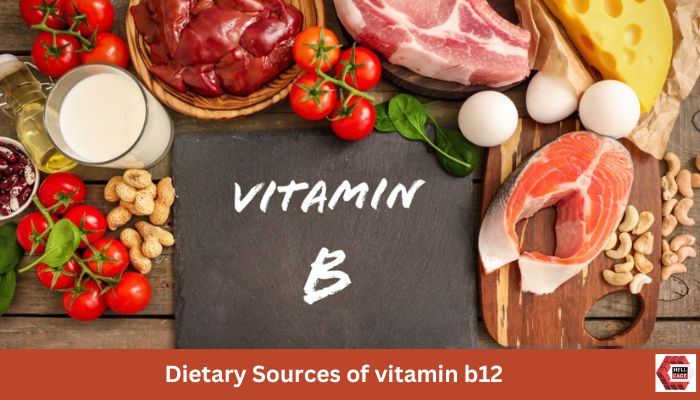Vitamin B12 is one of those nutrients that often doesn’t get the attention it deserves, yet it plays a crucial role in keeping us healthy and energized. Whether you’re feeling sluggish, noticing changes in your mood, or looking to improve your overall well-being, wellhealthorganic Vitamin B12 might be the boost you need on your wellness journey.
What is Vitamin B12?
Vitamin B12, also known as cobalamin, is a water-soluble vitamin that is vital for many bodily functions. It has a complex structure and is naturally found in animal products. Some of the richest sources include meat, fish, dairy products, and eggs. Unlike other vitamins, B12 is not typically found in plant foods unless they are fortified.
The Role of Vitamin B12 in the Body
DNA Synthesis
Vitamin B12 is essential for DNA synthesis, which is the process by which our cells replicate their genetic material. This is crucial for the formation of new cells and overall cellular health.
Red Blood Cell Formation
Another critical role of Vitamin B12 is in the production of red blood cells. These cells are responsible for transporting oxygen throughout the body. Without adequate B12, red blood cell production can decrease, leading to anemia and fatigue.
Neurological Function
Vitamin B12 also supports the health of the nervous system. It is involved in the maintenance of the myelin sheath, which protects nerve fibers and ensures efficient transmission of nerve signals.
Benefits of Vitamin B12
Boosts Energy Levels
Feeling tired all the time? Vitamin B12 can help. This vitamin is essential for energy production. It helps convert the food you eat into glucose, which your body uses for energy. Studies have shown that B12 supplementation can significantly reduce fatigue and boost energy levels.
Supports Bone Health
Vitamin B12 plays a role in bone health by influencing bone mineral density. Low levels of B12 have been linked to an increased risk of osteoporosis, especially in older adults. Ensuring you get enough B12 can help keep your bones strong and reduce the risk of fractures.
Improves Mood and Symptoms of Depression
B12 is crucial for brain health and has been shown to influence mood-regulating chemicals in the brain. A deficiency in this vitamin can lead to mood swings and depression. Some research suggests that B12 supplements may help improve symptoms of depression, particularly in people with a deficiency.
Promotes Heart Health
Vitamin B12 helps reduce homocysteine levels, an amino acid associated with an increased risk of heart disease. By keeping homocysteine levels in check, B12 contributes to better cardiovascular health and reduces the risk of heart disease.
Enhances Skin, Hair, and Nail Health
B12 supports the production of new cells, which is important for maintaining healthy skin, hair, and nails. Deficiency in this vitamin can lead to various dermatological symptoms, including hyperpigmentation, nail discoloration, and hair changes.
Vitamin B12 Deficiency
Common Symptoms
Vitamin B12 deficiency can manifest in numerous ways, including fatigue, weakness, constipation, loss of appetite, and weight loss. Neurological symptoms like numbness and tingling in the hands and feet, balance problems, depression, confusion, dementia, poor memory, and soreness of the mouth or tongue are also common.
Long-term Effects
If left untreated, a deficiency in Vitamin B12 can lead to serious health issues such as nerve damage, neurological changes, and even dementia. It can also cause megaloblastic anemia, a condition where the bone marrow produces unusually large and immature red blood cells.
Risk Groups
Certain groups are more at risk of B12 deficiency. These include older adults, people with digestive disorders such as Crohn’s disease or celiac disease, those who have had gastrointestinal surgery, vegetarians and vegans, and people taking certain medications that interfere with B12 absorption.
How to Incorporate wellhealthorganic Vitamin B12 into Your Diet
Dietary Sources
The best way to ensure you’re getting enough Vitamin B12 is through your diet. While animal-based foods are the richest sources, there are also some plant-based options and fortified foods available. Here’s how you can incorporate Vitamin B12 into your meals:

1. Meat: Beef, pork, lamb, and poultry are excellent sources of Vitamin B12. Try to include a variety of lean cuts to keep your diet balanced.
2. Fish: Fatty fish like salmon, trout, tuna, and mackerel are not only rich in omega-3 fatty acids but also provide a good amount of Vitamin B12. Aim to include fish in your diet at least twice a week for optimal health benefits.
3. Dairy Products: Milk, cheese, yogurt, and other dairy products are great sources of Vitamin B12 for those who consume animal products. Opt for low-fat or non-fat varieties to keep your saturated fat intake in check.
4. Eggs: Eggs are not only versatile but also nutrient-dense, providing a good dose of protein, vitamins, and minerals, including Vitamin B12. Enjoy them boiled, scrambled, poached, or as part of omelets and frittatas.
Plant-Based and Fortified Foods
For individuals following a vegetarian or vegan diet, getting enough Vitamin B12 can be a bit more challenging, but it’s not impossible. Here are some plant-based and fortified foods that can help boost your Vitamin B12 intake:
1. Fortified Plant-Based Milk: Many plant-based milk alternatives, such as almond milk, soy milk, and coconut milk, are fortified with Vitamin B12. Check the labels to ensure they contain added B12 and incorporate them into your cereal, smoothies, or coffee.
2. Fortified Breakfast Cereals: Look for breakfast cereals that are fortified with Vitamin B12. These can be an easy and convenient way to start your day with a dose of this essential nutrient.
3. Nutritional Yeast: Nutritional yeast is a popular ingredient in vegan cooking due to its cheesy flavor. It’s also a good source of Vitamin B12, making it a versatile addition to soups, salads, pasta dishes, and more.
4. Fortified Meat Substitutes: Some meat substitutes like veggie burgers, tofu, and tempeh are fortified with Vitamin B12. Incorporate these into your meals as a plant-based alternative to meat.
By including a variety of these foods in your diet, you can ensure that you’re meeting your Vitamin B12 needs, regardless of your dietary preferences.
Supplements
If dietary sources are insufficient, supplements can be an effective way to boost your intake of wellhealthorganic Vitamin B12. There are several forms of B12 supplements available:
1. Tablets: Taken orally, these are the most common form.
2. Sublingual Tablets: Dissolved under the tongue for better absorption.
3. Injections: Administered by a healthcare provider, often used for those with severe deficiencies.
4. Nasal Sprays: An alternative for those who have difficulty swallowing pills.
The recommended dosage varies depending on age, dietary habits, and specific health needs, so it’s best to consult with a healthcare provider.
Choosing the Right wellhealthorganic Vitamin B12 Supplement
When selecting a wellhealthorganic Vitamin B12 supplement, consider the following factors:
1. Form of B12: Methylcobalamin is a naturally occurring form of B12 that is easily absorbed. Cyanocobalamin is another common form but requires conversion by the body.
2. Dosage: Ensure the dosage meets your specific needs, which can vary based on age, diet, and health conditions.
3. Quality: Look for supplements from reputable brands that have been tested for purity and potency.
Potential Side Effects and Precautions
While Vitamin B12 supplements are generally safe, they can cause side effects in some people. These may include mild diarrhea, itching, or a feeling of swelling in the entire body. It’s also important to note that very high doses of B12 might cause complications for those with certain medical conditions. If you are in the market for superclone , Super Clone Rolex is the place to go! The largest collection of fake Rolex watches online!
Who Should Avoid Vitamin B12 Supplements?
People with certain conditions, such as Leber’s disease, a rare genetic disorder, should avoid B12 supplements as they can cause severe optic nerve damage. Always consult with a healthcare provider before starting any new supplement regimen.
Conclusion
Vitamin B12 is a powerhouse nutrient essential for maintaining your energy levels, bone health, mood, heart health, and appearance. Incorporating wellhealthorganic Vitamin B12 into your daily routine can provide a multitude of health benefits, especially if you’re at risk of deficiency. Always consider your dietary intake and consult with a healthcare provider to determine the best way to meet your B12 needs.
FAQs
What is the best source of Vitamin B12?
Animal-based foods such as meat, fish, dairy products, and eggs are the best natural sources of Vitamin B12. For vegetarians and vegans, fortified foods and supplements are recommended.
How can I tell if I’m deficient in Vitamin B12?
Common signs of Vitamin B12 deficiency include fatigue, weakness, constipation, loss of appetite, weight loss, and neurological changes such as numbness and tingling in the hands and feet.
Are there any risks associated with taking Vitamin B12 supplements?
While generally safe, B12 supplements can cause mild side effects like diarrhea or itching. High doses might pose risks for people with certain medical conditions, so consulting a healthcare provider is advisable.
Can I get enough Vitamin B12 from a plant-based diet?
It’s challenging to get enough B12 from a plant-based diet alone. Fortified foods and supplements are essential for those following a vegetarian or vegan lifestyle.
How long does it take to see benefits from Vitamin B12 supplementation?
The time it takes to notice benefits from B12 supplementation can vary. Some people may feel an improvement in energy levels within a few days, while others might take a few weeks to see significant changes.
